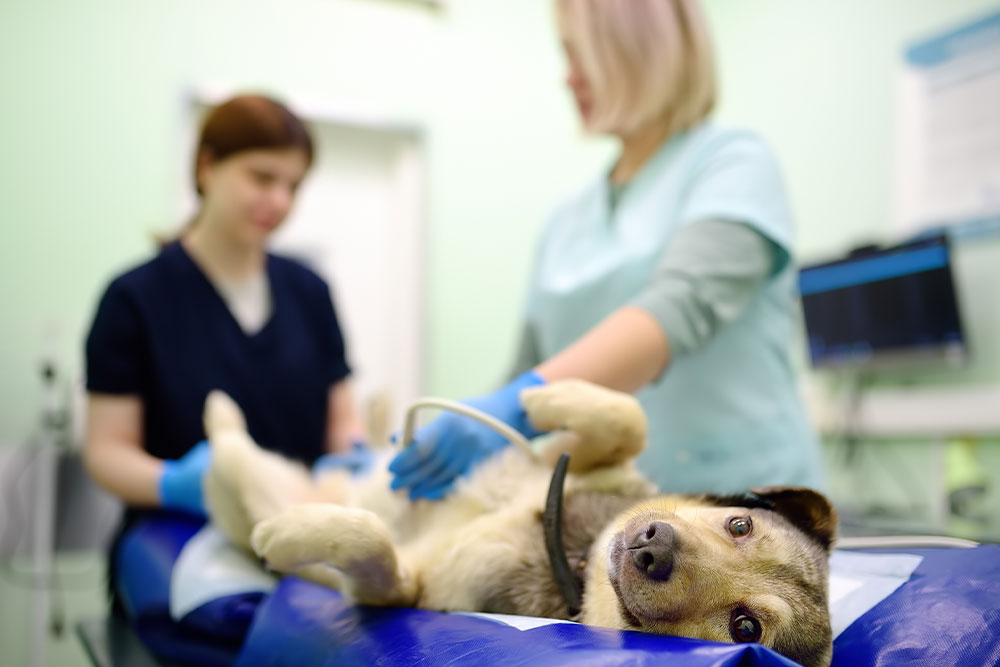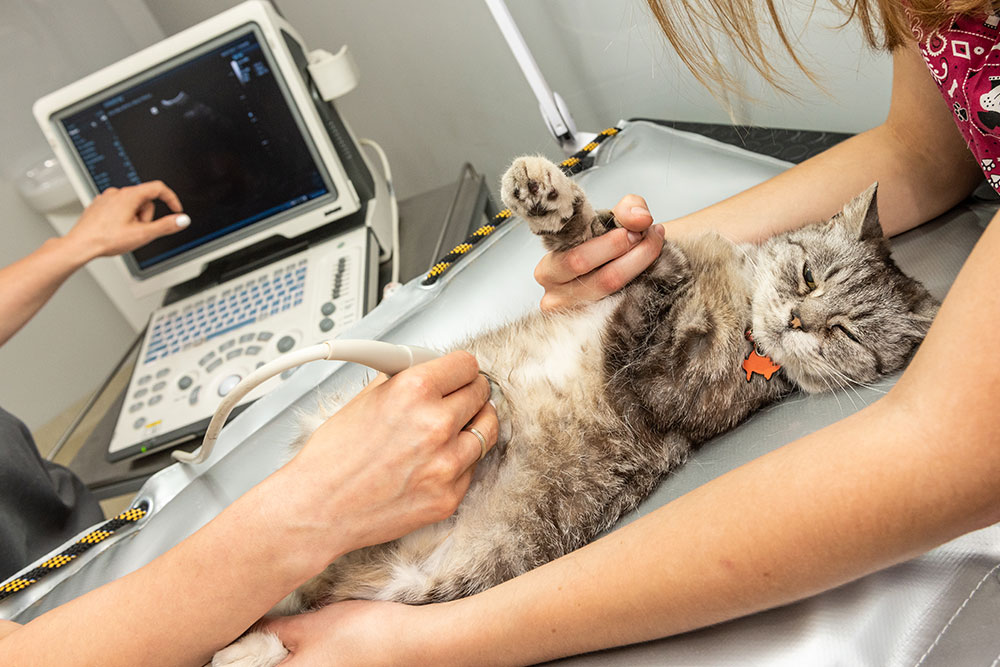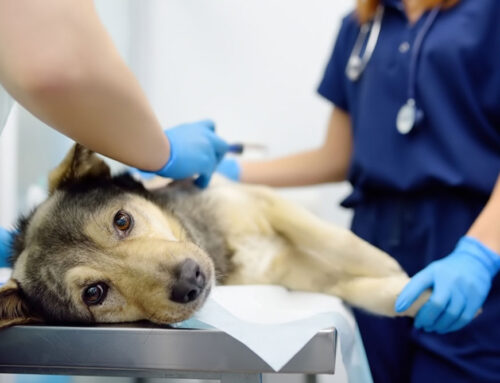How Ultrasound Helps Detect and Treat Pet Health Issues
When pets become sick, the signs are often vague. A cat may lose weight without explanation. A dog may vomit on and off, cough at night, or seem unusually tired. These symptoms can point to dozens of possible conditions, which is why finding the cause quickly is so important. Ultrasound gives veterinarians a safe, pain-free, noninvasive way to look inside the body and see what is happening in real time. From diagnosing abdominal pain to evaluating the heart, ultrasound is one of the most versatile tools in veterinary medicine, and it often provides the answers that bloodwork or X-rays alone cannot.
At Southern Crossing Animal Hospital, we combine this technology with comprehensive diagnostics and a concierge approach to care. Every scan is performed with gentle handling, clear communication, and the highest standards for patient safety so families leave with both answers and a plan.
What Ultrasound Is and Why It Matters
An ultrasound works by using sound waves to generate live images of internal organs. Unlike X-rays, which show bones and dense tissues, ultrasound excels at evaluating soft structures like the liver, spleen, bladder, heart, and intestines.
Most pets tolerate ultrasound well without sedation. If a pet is especially anxious or painful, mild sedation may be recommended to keep the experience calm and to allow a more thorough evaluation.
What to Expect During an Ultrasound
During the exam, a patch of fur is shaved for clear contact with the probe, and gel is applied to help transmit sound waves. Your pet rests on a cushioned table while our team captures moving images of targeted areas. Exams are often done in a quiet, dimly lit room with calming music and pheromone diffusers. This Fear Free approach, combined with gentle handling, minimizes stress for both dogs and cats.
When more information is needed, our in-house diagnostic laboratory can run blood and urine panels the same day, complementing the scan results.
When Vets Recommend Ultrasound
We recommend ultrasound when pets show persistent or unexplained symptoms such as chronic vomiting, diarrhea, changes in appetite, coughing, abdominal swelling, or weakness. Ultrasound is especially useful for conditions that mimic one another, since it can help distinguish between digestive issues, urinary disease, or heart-related problems.
- Cats with long-term vomiting may have anything from dietary intolerance to intestinal lymphoma.
- Dogs with chronic diarrhea may benefit from imaging to check for inflammatory bowel disease, parasites, or gastrointestinal foreign bodies.
- A new heart murmur often prompts a cardiac ultrasound, or echocardiogram, to evaluate the heart’s structure and function.
Because many of these conditions share overlapping signs, ultrasound helps narrow the possibilities quickly and with minimal stress.
Abdominal Ultrasound: Digestive, Liver, Spleen, and Kidneys
Abdominal ultrasound is one of the most common scans we perform, and it can reveal a wide range of issues:
- Digestive tract: Ultrasound can detect intestinal thickening and motility changes, which are common with lymphoma and inflammatory bowel disease in cats. It is also a critical tool for diagnosing gastrointestinal foreign bodies in dogs and cats that swallow non-food objects.
- Liver and spleen: Scans often identify masses or abnormal textures, such as splenic tumors like hemangiosarcoma in dogs. In emergencies, ultrasound can confirm hemoabdomen, where internal bleeding leads to collapse. Liver ultrasound reveals everything from cirrhosis to tumors.
- Kidneys and urinary tract: Ultrasound can identify stones, obstructions, or congenital problems like polycystic kidney disease in cats. Guided cystocentesis may also be used to collect sterile urine samples.
Ultrasound is also a standard tool in our cancer screening program, allowing us to monitor organ changes and guide biopsies when needed.
Cardiac Ultrasound: Echocardiograms for Heart Health
An echocardiogram is an ultrasound study of the heart. It allows veterinarians to see the heart’s chambers, valves, and blood flow in real time. This is especially important for pets with murmurs, arrhythmias, or suspected heart disease. Echocardiography can detect conditions such as cardiomyopathy, pericardial effusion, tumors, congenital defects, and heartworm-related complications.
At Southern Crossing, our ultrasound and echocardiogram services give pet families the answers they need quickly and safely. Early diagnosis often means earlier treatment, which can slow disease progression and improve quality of life.
Ultrasound-Guided Biopsy and Sampling
Beyond imaging, ultrasound guides fine-needle aspirates and biopsies to ensure accurate sampling of tumors or abnormal organs in a minimally invasive way. For pets with suspected cancers, guided sampling provides faster answers and more targeted treatment plans.
Emergency Uses: FAST Scans and Crisis Care
In urgent cases, a focused assessment (known as a FAST scan) can be life-saving. These quick ultrasounds check for free fluid in the abdomen or chest, ruptured organs, or major internal bleeding. If your pet is hit by a car, collapses suddenly, or has severe breathing difficulty, ultrasound often guides our immediate decisions. Visit our emergencies page for more information on what to do in a crisis.
Ultrasound: Diagnosis From Compassionate Care
While ultrasound is a powerful tool on its own, it works best alongside other diagnostics such as bloodwork, X-rays, or even endoscopy. These combined results allow veterinarians to confirm a diagnosis, explain findings, and outline the most effective treatment plan. Some conditions can be managed medically, while others may require surgery through our soft tissue and orthopedic surgery service.
At the same time, the experience of the exam matters just as much as the outcome. At Southern Crossing, every ultrasound is performed with a focus on both accuracy and comfort. Our AAHA accreditation reflects rigorous standards in anesthesia, pain management, and quality control, while our Fear Free certification ensures pets are treated with calm, gentle handling that minimizes stress.
Expert Veterinary Ultrasound in Memphis
From subtle digestive problems to life-threatening emergencies, ultrasound gives veterinarians critical insights without invasive surgery. Whether used to confirm a diagnosis, stage a disease, or guide treatment, it is one of the most versatile tools in modern veterinary medicine.
At Southern Crossing Animal Hospital, our concierge approach ensures every ultrasound exam is paired with clear communication, tailored recommendations, and compassionate care. If your pet is showing concerning symptoms, contact us today to schedule a diagnostic consultation. With advanced imaging, comprehensive support, and a focus on comfort, we are here to help pets live healthier, happier lives.









Leave A Comment